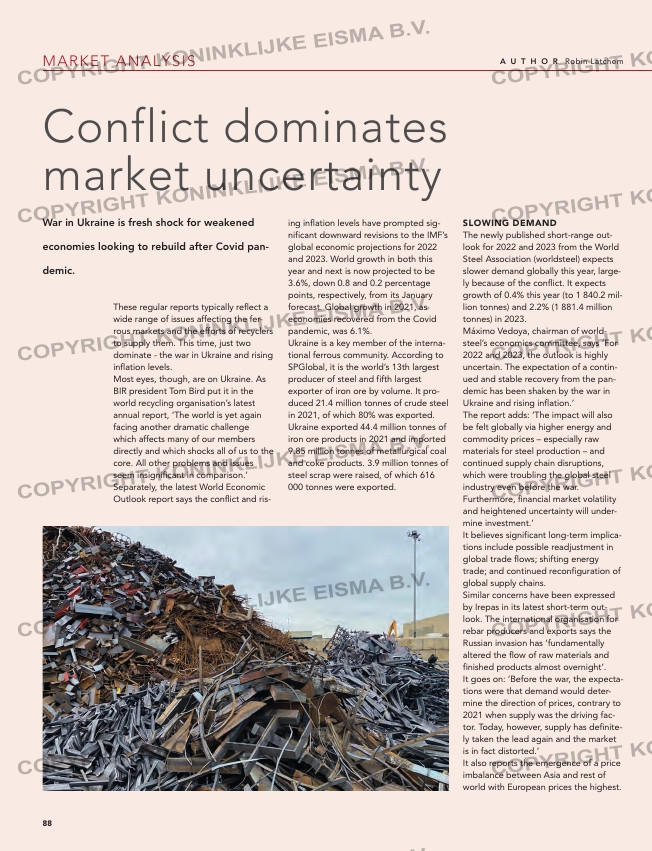Page 88 from: Recycling International May issue | 2022

MARKET ANALYSIS
Conflict dominates
market uncertainty
War in Ukraine is fresh shock for weakened
economies looking to rebuild after Covid pan-
demic.
88
With US mills running at full capacity,
Irepas expects any increase in demand
to be met by imports. It notes prices in
the US are also on an upward trend,
catching up with the rest of the world.
LULL IN TURKISH IMPORTS
A key bellwether in the ferrous export
market is activity into Turkey. Reports of
trade in heavy steel scrap suggest busi-
ness is very quiet with weak finished
long steel sales. However, the few deals
being done reflect higher prices, up
from just under US$ 500 per tonne in
January to well over US$ 600 per tonne
in February and March (see charts).
Meanwhile, steel producers have been
adapting to the enforced changes to
the market with ArcelorMittal reported
to have eliminated Russian commodities
from its supply chain. According to
Bloomberg, the steel giant said it previ-
A U T H O R Robin Latchem
SLOWING DEMAND
The newly published short-range out-
look for 2022 and 2023 from the World
Steel Association (worldsteel) expects
slower demand globally this year, large-
ly because of the conflict. It expects
growth of 0.4% this year (to 1 840.2 mil-
lion tonnes) and 2.2% (1 881.4 million
tonnes) in 2023.
Máximo Vedoya, chairman of world-
steel’s economics committee, says ‘For
2022 and 2023, the outlook is highly
uncertain. The expectation of a contin-
ued and stable recovery from the pan-
demic has been shaken by the war in
Ukraine and rising inflation.’
The report adds: ‘The impact will also
be felt globally via higher energy and
commodity prices – especially raw
materials for steel production – and
continued supply chain disruptions,
which were troubling the global steel
industry even before the war.
Furthermore, financial market volatility
and heightened uncertainty will under-
mine investment.’
It believes significant long-term implica-
tions include possible readjustment in
global trade flows; shifting energy
trade; and continued reconfiguration of
global supply chains.
Similar concerns have been expressed
by Irepas in its latest short-term out-
look. The international organisation for
rebar producers and exports says the
Russian invasion has ‘fundamentally
altered the flow of raw materials and
finished products almost overnight’.
It goes on: ‘Before the war, the expecta-
tions were that demand would deter-
mine the direction of prices, contrary to
2021 when supply was the driving fac-
tor. Today, however, supply has definite-
ly taken the lead again and the market
is in fact distorted.’
It also reports the emergence of a price
imbalance between Asia and rest of
world with European prices the highest.
These regular reports typically reflect a
wide range of issues affecting the fer-
rous markets and the efforts of recyclers
to supply them. This time, just two
dominate – the war in Ukraine and rising
inflation levels.
Most eyes, though, are on Ukraine. As
BIR president Tom Bird put it in the
world recycling organisation’s latest
annual report, ‘The world is yet again
facing another dramatic challenge
which affects many of our members
directly and which shocks all of us to the
core. All other problems and issues
seem insignificant in comparison.’
Separately, the latest World Economic
Outlook report says the conflict and ris-
ing inflation levels have prompted sig-
nificant downward revisions to the IMF’s
global economic projections for 2022
and 2023. World growth in both this
year and next is now projected to be
3.6%, down 0.8 and 0.2 percentage
points, respectively, from its January
forecast. Global growth in 2021, as
economies recovered from the Covid
pandemic, was 6.1%.
Ukraine is a key member of the interna-
tional ferrous community. According to
SPGlobal, it is the world’s 13th largest
producer of steel and fifth largest
exporter of iron ore by volume. It pro-
duced 21.4 million tonnes of crude steel
in 2021, of which 80% was exported.
Ukraine exported 44.4 million tonnes of
iron ore products in 2021 and imported
9.85 million tonnes of metallurgical coal
and coke products. 3.9 million tonnes of
steel scrap were raised, of which 616
000 tonnes were exported.
88-89-90-91_maferrous.indd 88 02-05-2022 15:48



